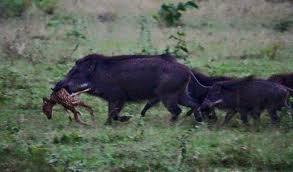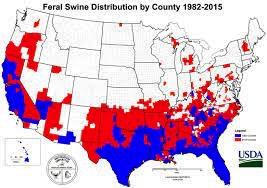 A study conducted by the Arkansas Agricultural Experiment Station recently quantified the damage caused by feral hogs. These pests are present in 35 states and are responsible for at least $1.5 billion in damage annually. The survey involved 4,500 landowners farming more than 200 acres in 2021. The report was based on 900 survey responses from Texas, Louisiana and Arkansas.
A study conducted by the Arkansas Agricultural Experiment Station recently quantified the damage caused by feral hogs. These pests are present in 35 states and are responsible for at least $1.5 billion in damage annually. The survey involved 4,500 landowners farming more than 200 acres in 2021. The report was based on 900 survey responses from Texas, Louisiana and Arkansas.
Landowners operating crop-land lost on average $28 per acre over a five-year period due to damaged corn, soybean, wheat, rice and forage crops. Farmers operating pasture-land lost $11 per acre as a result of rooting and grubbing by hogs. The values calculated did not take into account devaluation of land value based on the presence of hogs.
The $1.5 billion estimate will appear miniscule should African swine fever (ASF) be introduced into the U. S. from either Asia or the Caribbean. The presence of wild boars in Eastern Europe and their migration westward has seriously impacted export of pork by Germany and has imposed additional costs for control. Eradication of ASF in the absence of an effective vaccine is regarded as impossible with the presence of a population of free-roaming hogs or wild boars.
 Given the emergence and spread of African swine fever in Europe, Asia and Africa, efforts to initially control and then eliminate wild hogs should be expedited as a preemptive measure to prevent a sustained outbreak or endemic status in the U.S. At the present time, the commercial swine industry is concentrated in states that as yet do not have significant populations of feral swine. Elimination of these pests should be a priority in Midwestern states followed by a concerted program to extend southward to the Gulf states.
Given the emergence and spread of African swine fever in Europe, Asia and Africa, efforts to initially control and then eliminate wild hogs should be expedited as a preemptive measure to prevent a sustained outbreak or endemic status in the U.S. At the present time, the commercial swine industry is concentrated in states that as yet do not have significant populations of feral swine. Elimination of these pests should be a priority in Midwestern states followed by a concerted program to extend southward to the Gulf states.
If the USDA can expend millions on establishing and supporting nonviable, small processing plants and on social engineering, they may wish to support and fund a program that would have untold benefit to both domestic production and exports of pork and reduce an inevitable impact on consumers as a result of persistent ASF.